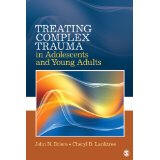|
Treating Complex Trauma in Adolescents and Young Adults
John Briere and Cheryl Lanktree

Book description, reviews, and downloadable materials
Sage Publications (ISBN: 978-1-4129-8144-6): August 2011, 264 pages
Click here to order
Treating Complex Trauma in Adolescents and Young Adults describes an empirically validated, multi-component approach to the treatment of multi-traumatized adolescents and young adults. This treatment guide is based on a four year federally-funded project to develop a treatment protocol for multiply traumatized, often socially marginalized youth, referred to as Integrative Treatment of Complex Trauma for Adolescents (ITCT-A). Interventions are adapted according to the youth's specific symptoms, culture, and age, and include relationship-building, psychoeducation, affect regulation training, trigger identification, cognitive processing, titrated emotional processing, mindfulness training, collateral treatments with parents and families, group therapy, and system-level advocacy. See bottom of page for reviews.
Readers of Treating Complex Trauma in Adolescents and Young Adults (and other clinicians employing ITCT-A) are invited to download the following forms and clinical materials in PDF format (Note: These links will open in a new browser window.):
· Initial Trauma Review – Adolescents (ITR-A)
· Assessment-Treatment Flowchart – Adolescents (ATR-A)
· Written Homework About My Trauma
· What Triggers Me
Reviews of Treating Complex Trauma in Adolescents and Young Adults
Drs. Briere and Lanktree have admirably succeeded in describing a truly integrative approach to psychotherapy for children and adolescents whose complex trauma histories and correspondingly complex symptoms present clinicians with a formidable challenge. This book provides a uniquely comprehensive guide to treatment planning, assessment, and therapy strategies that should be required reading for every therapist working with these youths.
Julian Ford, Ph.D., University of Connecticut Health Center
This is a gem of a book about the assessment and treatment of youth with complex trauma histories. The authors provide an evidence-based integrated assessment and treatment approach that emanates good sense and compassion. The book provides clear descriptions of strategies for matching interventions to problems, guided by treatment principles that will allow the practitioner to apply interventions in a flexible manner. The book does not shirk from exploring the “real world” of treating adolescents and gives practical guidance about how to connect with teens, and how to work with families and childcare protective systems, all written in a very readable and engaging style. This book is a must for anyone working with traumatized adolescents.
Marylene Cloitre, Ph.D., National Center for PTSD
This important text offers a comprehensive and practical treatment model for complex trauma, Integrative Treatment of Complex Trauma for Adolescents (ITCT-A), for an age group that has not received adequate attention. The model is based on the most current research and treatment recommendations and expands upon the state of the art. Drs. Briere and Lanktree are to be congratulated for developing this highly integrative model and for providing therapists with such a clear description of its use and applications. Treating Complex Trauma in Adolescents and Young Adults is destined to be a classic.
Christine A. Courtois, PhD., ABPP, Courtois & Associates, PC
This innovative book provides clinicians with an immediately useful blueprint for negotiating challenging clinical issues when working with teens and young adults with histories of complex trauma. The combined clinical experience of these two seasoned researchers/clinicians is evident as they emphasize a customized approach that integrates both structure and flexibility. Of particular value are assessment-treatment tools that encourage a detailed assessment of the client's current functioning, along with clear guidelines for transitioning from problems to interventions. Their approach also promotes a strong therapy relationship that attends to culture, development, and gender. I highly recommend this evidence-informed, clinically-sound, and inspired book.
Eliana Gil, Ph.D., Gil Center for Healing and Play
Drs. Briere and Lanktree’s keenly insightful approach provides the therapist a window into the intricacies and challenges confronting youth from different social and ethno/cultural communities. It offers innovative, culturally sensitive strategies for assessing and treating high-risk, traumatized youth, and embodies the single most important goal of our profession's collective efforts: taking our findings from clinical and research settings to communities - "bench to the trench," striving to ensure that no child is, in fact, left behind.
Russell T. Jones, Ph.D., Virginia Tech University
A major contribution! Pioneers in the field of complex trauma, Briere and Lanktree seamlessly integrate theory and practical strategies, making this book an invaluable resource for the seasoned clinician and beginning therapist alike.
Mandy Habib, Psy.D., North Shore University Hospital
Over the past two decades, scientists, mental health practitioners and service providers have developed considerable interest in understanding the phenomenology of complex trauma in children, adolescents and adults who have suffered repeated and severe exposures to a wide-range of childhood traumatic experiences, including physical, sexual and emotional abuse and domestic violence. With this interest has emerged a growing body of research and information on the nature, assessment, and treatment of complex trauma that the authors of Treating Complex Trauma in Adolescents and Young Adults have integrated into a comprehensive and compelling, evidence-informed and assessment-driven treatment model and approach: Integrative Treatment of Complex Trauma for Adolescents (ITCT-A). Addressing a major gap in the trauma-treatment literature, this exceptionally well-written volume is an indispensable resource for psychologists, psychiatrists, social workers, psychiatric nurse practitioners, and therapists working with severely traumatized adolescents and their caregivers across the child-serving systems that provide care, including private practice, mental health clinics, family medicine and pediatrics, child welfare, juvenile justice, schools, and substance abuse treatment.
John A. Fairbank, Ph.D., UCLA-Duke University National Center for Child Traumatic Stress
Briere and Lanktree make an important contribution to the literature on trauma-focused therapies in this treatment manual. They pay special attention to the context of traumatic experiences for youth and provide valuable direction, especially for the most harrowing, risky, and complex circumstances. We are reminded that trauma is almost never a stand alone event.
Lucy Berliner, M.S.W., Harborview Center for Sexual Assault and Traumatic Stress
|